AWM41 1019 - [Nurses Narratives] Sister J O'Dwyer - Part 1
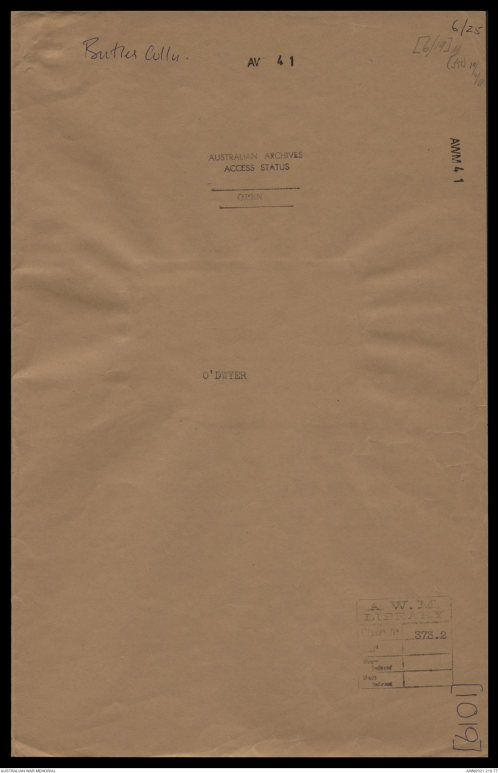
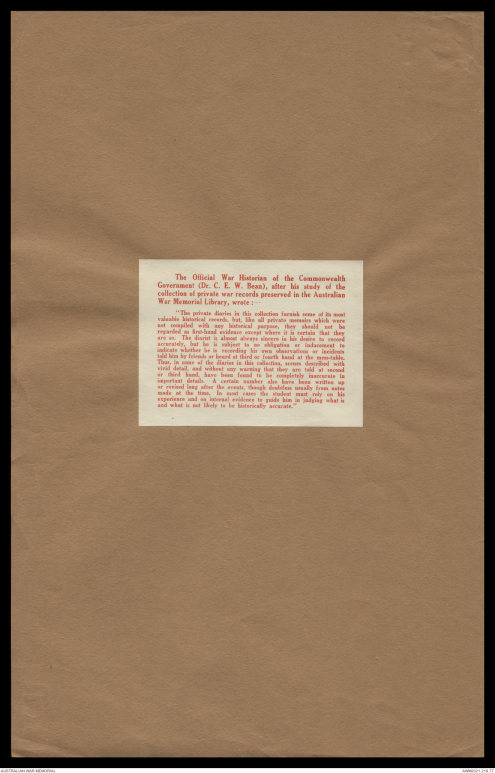
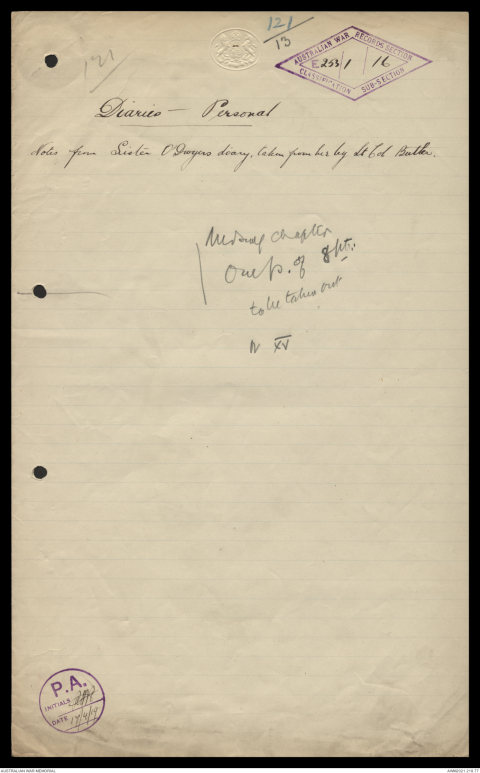
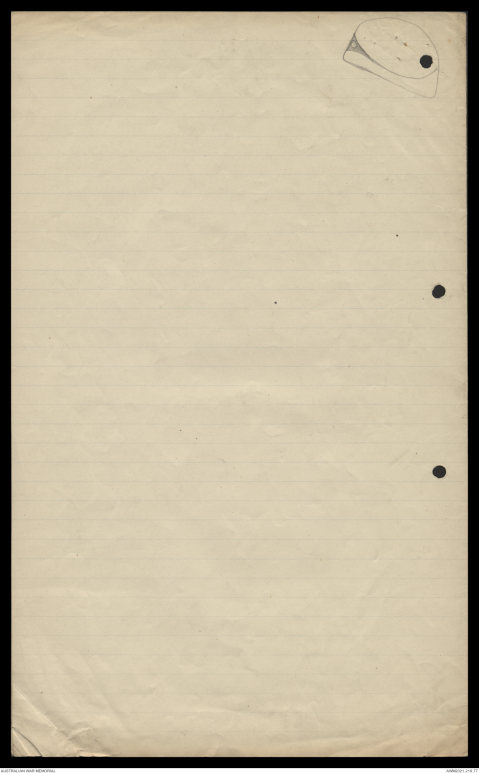
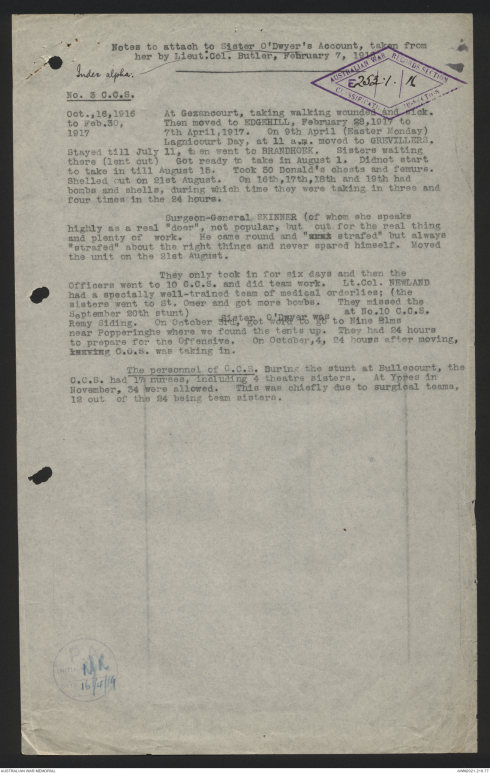
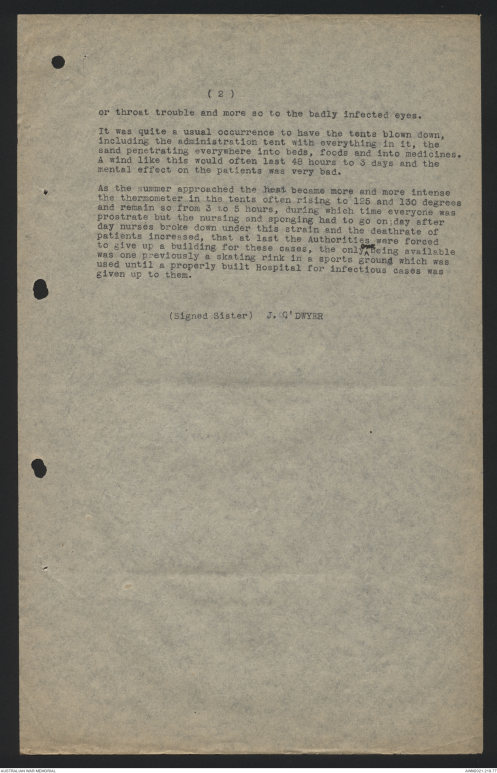
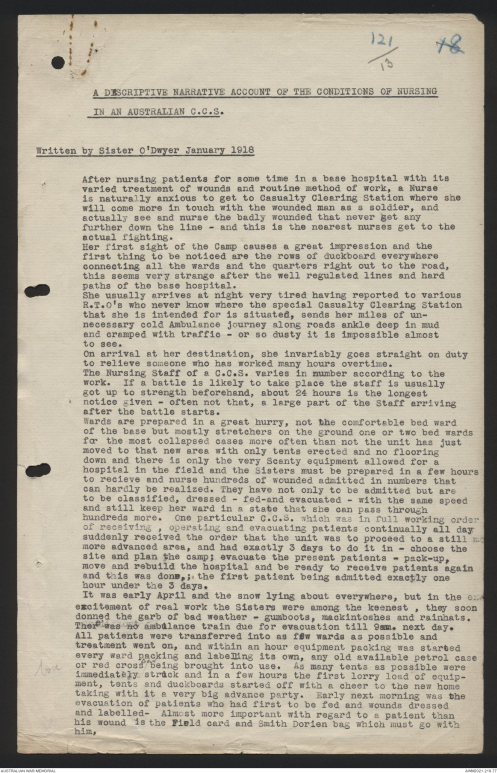
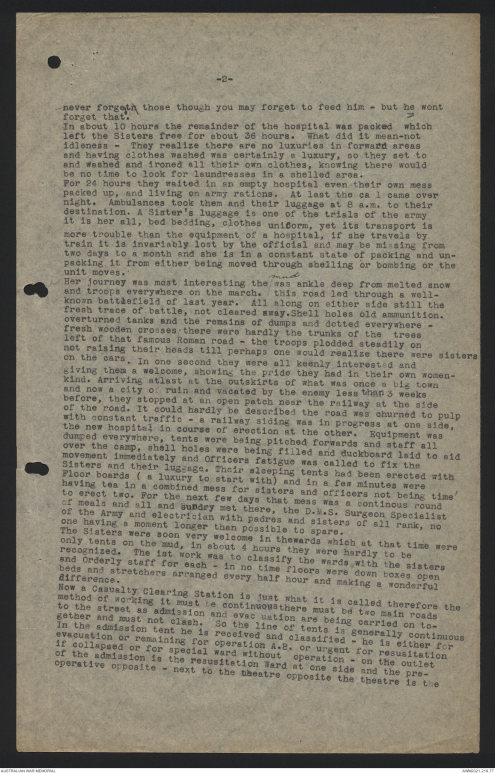
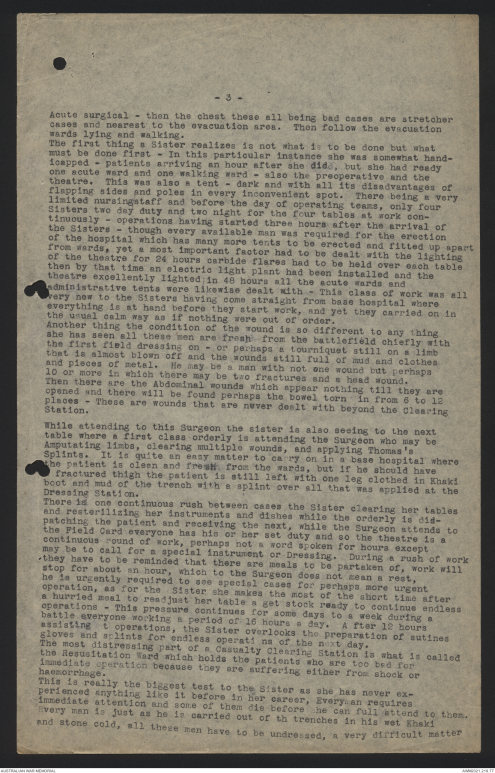
6/25
Butler
[6/19] [[?]]
[[?]]
AV 41
AUSTRALIAN ARCHIVES
ACCESS STATUS
OPEN
AWM 41
O'DWYERn
A.W.M.
LIBRARY
[[?]] 373.2
[1019]
The Official War Historian of the Commonwealth
Government (Dr. C. E. W. Bean), after his study of the
collection of private war records preserved in the Australian
War Memorial Library, wrote:-
"The private diaries in this collection furnish some of its most
valuable historical records, but, like all private memoirs which were
not compiled with any historical purpose, they should not be
regarded as first-hand evidence except where it is certain that they
are so. The diarist is almost always sincere in his desire to record
accurately, but he is subject to no obligation or inducement to
indicate whether he is recording his own observations or incidents
told to him by friends or heard at third or fourth hand at the mess-table.
Thus, in some of the diaries in this collection, scenes described with
vivid detail, and without warning that they are told at second
or third hand, have been found to be completely inaccurate in
important details. A certain number also have been written up
or revised long after the events, though doubtless usually from notes
made at the time. In most cases the student must rely on his
experience and on internal evidence to guide him in judging what is
and what is not likely to be historically accurate."
121
121/13
AUSTRALIAN W
Diaries - Personal
Notes from Sister O’Dwyers diary, taken from his leg by Lt Col Butler.
| ?Mur??y Cha??r
Ow? . of 8l?:
To be taken out
[[ XV
P.A.
INITALS
DATE 17/4/19
Notes to attach to Sister O’Dwyers Account, taken from
her by Lieut:Col. Butler, February 7, 1919
Index alpha
AUSTRALIAN WAR RECORDS SECTION
E252.1.16
CLASSIFICATION ?
No. 3 C.C.S.
Oct., 16, 1916
to Feb.30,
1917
At Gezancourt, taking walking wounded and sick.
Then moved to EDGEHILL, February 28, 1917 to
7th April, 1917. On 9th April (Easter Monday)
Lagnicourt Day, at 11 a.m. moved to GREVILLERS.
Stayed till July 11, then went to BRADNHORK. Sisters waiting
there (lent out) Got ready to take in August 1. Didn’t start
to take in till August 15. Took 50 Donald’s chests and femurs.
Shelled out on 21st August. On 16th, 17th, 18th and 19th had
bombs and shells, during which time they were taking in three and
four times in the 24 hours.
Surgeon-General SKINNER (of whom she speaks
highly as a real “doer” , not popular, but out for the real thing
and plenty of work. He came round and “xxxx strafed” but always
“strafed” about the right things and never spared himself. Moved
the unit on the 31st August.
They only took in for six days and then the
Officers went to 10 C.C.S. and did team work. Lt.Col. NEWLAND
had a specially well-trained team of medical orderlies; (the
sisters went to St. Omer and got more bombs. They missed the
September 20th stunt) Sister O’Dwyer was at No.10 C.C.S.
Romy Siding. On October 3rd, got word to go to Nine Blns
near Popperringhs where we found the tents up. They had 24 hours
to prepare for the Offensive. On October,4, 24 hours after moving,
xxxxxxg C.C.S. was taking in.
The personnel of C.C.S. During the stunt at Bullecourt, the
C.C.S. had 17 nurses, including 4 theatre sisters. At Ypres in
November, 34 were allowed. This was chiefly due to surgical teams,
12 out of 24 being team sisters.
P.A.
INITALS MR
DATE 16/4/19
(2)
or throat trouble and more so to the badly infected eyes.
It was quite a usual occurrence to have the tents blown down,
including the administration tent with everything in it, the
sand penetrating everywhere into beds, foods and into the medicines.
A wind like this would often last 48 hours to 3 days and the
mental effect on the patients was very bad.
As the summer approached the heat became more and more intense
the thermometer in the tent often rising to 125 and 130 degrees
and remain so from 3 to 5 hours, during which time everyone was
prostrate but the nursing and sponging had to go on; day after
day nurses broke down under this strain and the deathrate of
patients increased, that at last the authorities were forced
to give up a building for these cases, the only^one being available
was one previously a skating rink in a sports ground which was
used until a properly built hospital for infectious cases was
given up to them.
(Signed Sister) J. O’DWYER
A DESCRIPTIVE NARRATIVE ACCOUNT OF THE CONDITIONS OF NURSING
IN AN AUSTRALIAN C.C.S.
Written by Sister O’Dwyer January 1918
After nursing patient for some time in a base hospital with its
varied treatments of wounds and routine method of work, a Nurse
is naturally anxious to get to Casualty Clearing Station where she
will come more in touch with the wounded man as a soldier, and
actually see and nurse the badly wounded that never get any
further down the line – and this is the nearest nurses get to the
actual fighting.
Her first sight of the Camp causes a great impression and the
first thing to be noticed are the rows of duckboard everywhere
connecting all the wares and the quarters right out to the road,
this seems very strange after the well regulated lines and hard
path of the base hospital.
She usually arrives at night very tired having reported to various
R.T.O’s who never know where the special Casualty clearing Station
that she is intended for is situated, sends her miles of un-
necessary cold Ambulance journey across roads ankle deep in mud
and cramped with traffic – or so dusty it is impossible almost
to see.
On arrival at her destination, she invariably goes straight on duty
to relieve someone who gas worked many hours overtime.
The Nursing staff of a C.C.S. varies in number according to the
work. If a battle is likely to take place the staff is usually
got up to strength beforehand, about 24 hours is the longest
notice given – often not that, a large part of Staff arriving
after the battle starts.
Wards are prepared in a great hurry, not the comfortable bed ward
of the base but mostly stretchers on the ground one or two bed wards
for the most collapsed cases more of then that not the unit has just
moved to that new area only with tents erected and no flooring
down and there is only the very Scanty equipment allowed for a
hospital in the field and the Sisters must be prepared in a few hours
to receive and nurse hundreds of wounded admitted n numbers that
can hardly be realized. They have not only to be admitted but are
to be classified, dressed – fed-and evacuated – with the same speed
and still keep her ward in a state that she can pass through
hundreds more. One particular C.C.S. which was in full working order
of receiving, operating and evacuating patients continually all day
suddenly received the order that the unit was to proceed to a still
more advanced area, and had exactly 3 days to do it in – choose the
site and plan the camp; evacuate the present patients – pack-up,
move and rebuild the hospital and be ready to receive patients again
and this was done; the first patient being admitted exactly one
hour under the 3 days.
It was early April and the snow lying everywhere, but in the
Excitement of real work the Sisters were among the keenest, they soon
donned the garb of bad weather – gumboots, mackintoshes and rainhats.
There was no ambulance train due for evacuation till 9am. Next day.
All patients were transferred into a few wards as possible ad
treatment went on, and within an hour equipment packing was started
every ward packing and labelling its own, any old available petrol case
or red cross being brought into use. A many tents as possible were
immediately struck and in a few hours the first lorry load of equip-
ment, tents and duckboards started off with a cheer to the new home
taking with it a very big advance party. Early the next morning was the
evacuation of patients who had first to be fed and wounds dressed
and labelled- Almost more important with regard to a patient than
his wound id the Field card and Smith Dorien bag which must go with
(2)
never forget it those though you may forget to feed hum - but he wont forget that.
In about 10 hours the remainder of the hospital was packed which left the Sisters free for about 36 hours. What did it mean - not idleness - They realise there are no luxuries in forward areas and having clothes washed was certainty a luxury, so they set to and washed and ironed all their own clothes, knowing there would be no time to look for laundresses in a shelled area.
For 24 hours they waited in an empty hospital even their own mess packed up, and living on army rations. At last the ca 1 came over night. Ambulances took them and their luggage at 8.a.m. to their destination. A Sister's luggage is one of the trial of the army it is her all, bed bedding, clothes uniform, yer its transport is more trouble then the equipment of a hospital, if the travels by train it it invariably lost by the official and may be missing from two days to a month and she is in a constant state of packing and unpacking it from either being moved through shelling or bombing or the unit moves.
Her journey was most interesting the was ankle deep from melted snow and troops everywhere on the march. this road led through a well-known battlefield of last year. All along on either side still the fresh trace of battle, not cleated away. Shell holes old ammunition, overturned tanks and remains of dumps and dotted everywhere - fresh wooden crosses there were hardly the trunks of the trees left of that famous Roman road - the troops plodded steadily on not raising their heads till perhaps one would realise there were sisters on the cars. In one second they were all keenly interested and giving them a welcome, showing the pride they had in their own women-kind. Arriving at last at the outskirts of what was once a big town and now a city of ruin and vacated by the enemy less than 3 weeks before, they stopped at an open patch neat the railway at the side of the road. It could hardly be described the road was churned to pulp with constant traffic - a railway siding was in progress are one side, the new hospital in course of erection on the other. Equipment was dumped everywhere, tents were being pitched forwards and staff all over the camp, shell holes were being filled and buckboard laid to aid movement immediately and officers fatigue was called to fix the Sisters and their luggage. Their sleeping tents had been erected with Floor boards (a luxury to start with) and in a few minutes were having tea in a combined mess for slaters and officers not being time' to erect two. For the next few days that mess was a continuous round of meals and all and sundry met there, the D.M.S Surgeon Specialist of the Army and electrician which padres and sisters of all rank, no one having a moment longer then possible to spare.
The Sisters were soon very welcome in the wards which at the time were only tents on the mud, in about 4 hours they were hardly to be recognised. The 1st work was to classify the wards with the sisters and Orderly staff for each - in no time floors were down boxes open beds and stretched arranged every half hour and making a wonderful difference. Now a Casualty Clearing Station is just what it is called therefore, the method of working it must be continuous there must be two main roads to the street as admission and evacuation are being carried on together and must not clash. So the line of tents is generally continuous In the admission tent he is received and classified - he is either for evacuation or remaining for operation A.B> or urgent for resuscitation if collapsed or for special ward without operation - on the outlet of the admission is the resuscitation Ward at one side and the preoperative opposite - next to the theatre opposite the theatre is the
-3-
Acute surgical - then the chest these all being bad cases are stretcher cases and nearest to the evacuation area. The follow the evacuation wards lying and walking.
The first thing a Sister realises is not what is to be done but what must be done first - In this particular instance she was somewhat handclapped - patients arriving an hour after she did, but she had ready one acute ward and one walking ward - also the preoperative and the theatre. This was also a tent - dark and with all its disadvantages of flapping sides and poles in every inconvenient apot. There being a very limited nursing staff and before the day of operating teams, only four Sisters two day duty and two night for the four tables at work continuously - operations having started three hours after the arrival of the Sisters - though every available man was required for the erection from wards, yet a most important factor had to be dealt with the lighting of the theatre for 24 hours carbide flares had to be held over each table then by that time an electric light plant had been installed and the administrative tents were likewise dealt with - This class of work was all every now to the Sisters having come astraight from base hospital where everything is at hand before they start work, and yet they carried on to the usual calm an if nothing were our of order.
Another thing the condition of the wound is so different to any thing she has seen all these men are fresh from the battlefield chiefly with the first field dressing 0n - or perhaps a tourniquet still on a limb that is almost blown off and the wounds still full of mud and clothes and pieces of metal. He may be a man with not one wound but perhaps 10 or more in which there may be two fractures and a hand wound. Then there are the Abdominal wounds which appear nothing till they are opened and there will be found perhaps the bowel torn in from 6 to 12 places - There are wounds that are never dealt with beyond the Clearing Station.
While tending to this Surgeon the sister is also seeing to the next table where a first class orderly is attending the Surgeon who may be Amputating limbs, clearing multiple wounds, and applying Thomas's Splints. It is quite an easy matter to carry on in a base hospital where the patient is olsen and fresh from the wards, but if he should have fractured thigh the patient is still left with one leg clothed in Khaki boot and mud of the trench with a splint over all that was applied at the Dressing Station.
There is one continuous rush between cases and Sister clearing her tables and resterilising her instruments and dishes while the orderly is dispatching the patient and receiving the next, while the Surgeon attends to the Field Card everyone has his or her set duty and so the theatre is a continuous round of work, perhaps not a word spoken for hours except may be to call for a special instrument or Dressing. During a rush of work they have to be reminded that there are meals to be partaken of, work will stop for about an hour, which to the Surgeon does not seen a rest, he is urgently required to see special cases for perhaps more urgent operation, as for the Sister she makes the most of the short time after a hurried meal to readjust her table a get stock ready to continue endless operations - This pressure continues for some days to a week during a battle everyone working a period of 16 hours a day. After 12 hours assisting t operations, the Sister overlooks the preparation of sutines gloves and splints for endless operon of the next day.
The most distressing part of a Casualty Clearing Station is what is called the Resuscitation Ward which holds the patient who are too bad for immediate operation because they are suffering either from shock or haemorrhage.
This is really the biggest test of the Sister as she has never experienced anything like it before in her career, every an requires immediate attention and some of them die before she he can full attend to them. Every man is just as he is carried our of th trenches in his wet Khaki and stone cold, all these men have to be undressed, a very difficult matter
 Sam scott
Sam scottThis transcription item is now locked to you for editing. To release the lock either Save your changes or Cancel.
This lock will be automatically released after 60 minutes of inactivity.